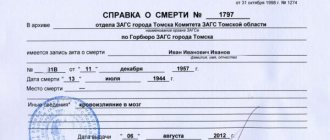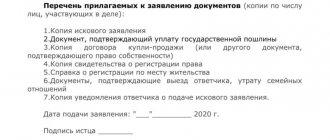Divorce proceedings are a complex and lengthy procedure. The couple faces various difficulties and difficulties; they have to divide property, determine the amount and procedure for alimony payments, and resolve property disputes. The question of who will stay in the apartment always becomes quite acute. This dispute can be resolved based on the Civil and Housing Code of the Russian Federation. In many ways, the resolution of the dispute depends on what type of housing stock the property belongs to and who is its owner.
It is necessary to take into account all the norms and standards of current legislation. An experienced lawyer can provide qualified assistance on this issue. An expert in this area of legal relations will tell you what rights and responsibilities a husband and wife have in relation to a privatized and state apartment after a divorce, will help you circumvent the pitfalls of the modern system, and will give effective recommendations.
There are many commercial companies operating in Russia that provide legal services to the population on a paid basis. An alternative solution would be to consult a lawyer on the Internet.
You can agree to remove a person from registration with the FMS peacefully or through the courts. It is best to entrust the representation of the plaintiff’s interests to a specialized lawyer.
Deregistration in a privatized apartment
After a divorce, it is not always possible to evict an ex-wife or even a common-law spouse from a privatized apartment. Each case is individual and requires a personal approach; it is important to take into account specific circumstances. It is worth noting that if the spouse was involved in registering housing as private property before marriage or receiving real estate as a gift/by will, then after the dissolution of the union the woman will not have any rights to housing. Writing it out without taking into account the opinion of the other party will be as simple and efficient as possible.
Read also: Ownership of a house: how to register
If the apartment became privatized during the spouses’ cohabitation, and the wife was a participant in the process and received a share of the living space, then it will be extremely problematic to write her out after the divorce. Also, the ex-wife will have the right to lifelong residence in the house if, during the privatization of housing, she renounced her share in favor of her husband. Apartments purchased with common funds during marriage are common privatized property and are subject to division in equal shares. Most often, one owner buys out the share of the second or the house is exchanged for separate housing. Having a marriage contract can simplify the situation. The contract most often contains conditions for dissolution of the union and division of property that would suit all participants in the process.
The algorithm of actions when discharging a wife from a privatized apartment is quite simple. Initially, you need to obtain a divorce certificate from the registry office, then try to reach an agreement with your spouse peacefully, and in case of refusal, you can file a claim in court.
The court will consider the case and make a decision to remove the residents from the privatized living space without their consent. With this document you should go to the migration service department that deals with registration and discharge of the population at the place of residence. It is important that the judge will take into account various factors and circumstances of the case. If the ex-wife does not have the opportunity to purchase housing and has nowhere to register in the future, the court may allow her to live in her husband’s living space after the divorce process.
Is it possible to expel my ex-husband from the apartment?
In some situations, the husband’s discharge is carried out without taking into account the opinion of the former companion, in others, conditions are required for the alienation of his right to use property.
Laws, codes and acts regulating the right of residence:
- Housing Code of the Russian Federation.
- Civil Code.
- Law of the Russian Federation on the right of movement of citizens (dated 06/25/1993 N 5242-1).
The wife who purchased the apartment or inherited it before marriage is considered the sole owner of the property. After the husband's registration, he retains only the right to use the property .
According to the Housing Code of the Russian Federation, Article 31, after the dissolution of the marriage relationship, the husband automatically loses the right to reside in the apartment . If housing was purchased during marriage, then the husband receives an equal share. It is difficult to discharge such a cohabitant without a trial after a divorce.
The legal basis to evict a husband by court decision opens after his refusal to pay off debt on utility bills for a period of more than six months (LC RF, Article 90). We discussed in more detail the question of how you can discharge a person who does not pay for it from an apartment here.
In order for the court to take into account this claim, it is necessary to provide receipts for payment for services; if the husband did not deposit the money, then he will not have it.
To simplify payment of utility bills, you need to divide your personal account.
Extract from communal housing
A municipal apartment is an apartment that does not belong to residents. It is the property of the state, and citizens have the opportunity to live in it after signing a social tenancy agreement. Regardless of who signed the agreement, spouses have equal rights in municipal property.
Read also: Consultation with a real estate lawyer
Having decided to get a divorce, you should understand that it will not be possible to evict your spouse after a divorce if she is a conscientious and responsible employer. The only solution will be to try to resolve the conflict peacefully. You can go to court with a request to remove your ex-wife from registration only if she does not permanently live in a municipal apartment or is registered at a different address. Also grounds for filing an eviction claim are the tenant’s bad behavior - rowdy behavior, accumulation of debts in the public utility sector, violation of the rights and peace of neighbors, etc. When turning to the courts, it is important to have documentary evidence and testimony that will confirm the woman’s absence at the specified address or her immoral behavior. Neighbors and residents of the house where the ex-wife is actually located can act as witnesses. The testimony must be recorded in writing. Also, paid utility receipts signed only by the plaintiff are suitable as confirmation.
Interestingly, in the event of a divorce, it will not be possible to evict a common child from a municipal apartment. Minor children have privileges guaranteed by law.
Guardianship and trusteeship authorities monitor the observance of children's rights. Their violation threatens with serious consequences for citizens.
If the eviction is carried out through the court, then the interests of the child will be the main criterion influencing the judge's decision. The views of children over 10 years of age will also be taken into account during the hearing.
If these conditions are met, there is a chance for the ex-husband to be discharged
It will be possible to write out an ex-husband without his consent only if ALL the conditions that are listed in paragraph 32 of the Resolution of the Plenum of the Supreme Court of the Russian Federation dated July 2, 2009 No. 14 are met. And it makes no difference whether the ex-husband is included in the warrant or social tenancy agreement, or he is simply registered as a family member in a municipal apartment. The conditions are listed in the form of a chain and they are considered by the judge in their entirety, i.e. all of them must be fulfilled:
- The ex-husband does not live in the apartment for a long time - clause 3 of Art. 83 Housing Code of the Russian Federation. The exact minimum term has not been established by law or judicial practice. The more the better. My opinion is at least 3 years . If he does not live for 1 year, then the chance of his being discharged is maximum 20%. If 2 years - 50%. If 3 years - 90%. No conscientious lawyer/attorney can guarantee 100% success, so I am as I am. According to paragraph 4 of Art. 69 of the Housing Code of the Russian Federation, if the ex-husband continues to live in a municipal apartment after a divorce, he retains the right to use like everyone else.↓
- He left the apartment on a permanent basis, and not temporarily due to study, work, business trips, treatment, etc. - Art. 71 Housing Code of the Russian Federation. That is, I took all my things out of the apartment. It’s even better if he lives with a new family or in another locality.↓
- He left voluntarily (Clause 2 of Article 1 of the RF Housing Code), and not forced due to conflicts with his former family or is in prison. A citizen who is in prison cannot be discharged from a municipal apartment. The court will refuse. More precisely, you can submit the court verdict to the passport office and it will be “formally” issued. After leaving prison, he can register back without any problems. If the apartment is privatized, he can easily challenge the privatization through the court and get a share. Even when the owners of the apartment change.↓
- He does not pay utility bills, does not participate in the repair and maintenance of the apartment - clause 4 of Art. 69 Housing Code of the Russian Federation. Preferably at least 3 years - according to the logic of the minimum period of non-residence. If the ex-husband proves in court that he pays at least part of the utilities, the claim will be rejected.↓
- He did not try to move into the apartment again, and if he did, he was NOT prevented from doing so.
By the above actions, the ex-husband shows the court that he VOLUNTARILY renounced his right of residence, and therefore loses it. Checkout instructions are written below.
There are more chances if you contact a lawyer
If all the above conditions are met, this only changes the matter halfway. The main difficulty is that in court the existence of conditions MUST BE PROVED IN WRITTEN. The judge will not believe the words and arguments. To prove everything, you need to provide the judge with certain certificates and acts from various government departments and organizations. An ordinary citizen will not be able to obtain most documents himself, because he does not have a certain status and authority. More precisely, he can make a request, but they will not answer it, since they are not obliged. So hire a lawyer. He, having legal status, will make inquiries about the necessary organizations - paragraphs. 1 clause 3 art. 6 and paragraph 5 of Art. 6.1 Federal Law of May 31, 2002 No. 63-FZ. Organizations are required to respond to requests from lawyers, otherwise they face a fine - Art. 5.39 Code of Administrative Offenses of the Russian Federation.
Be sure to read it! How to write a will without a notary: sample, form of will for all property
If you do not contact a lawyer, you can ask the judge to gather evidence. The judge will issue the requests, but will ask you to take them to the organizations. Plus pick up the answers to them. He will ask, but he cannot force you. And you will not have the opportunity to adjust requests that are more beneficial to you. And you will no longer be able to filter out the answers received and discard unnecessary ones. In addition, you will not know some of the answers because they will be sealed in envelopes. All this greatly reduces your chances of winning your case.
A lawyer will study your situation and make inquiries to those organizations that are beneficial to you. The lawyer will draw up requests, send them and collect responses to them. From the received answers, he will select the most useful ones. I have indicated below which organizations you need to contact.
The most important thing is that it is much CHEAPER to hire a lawyer and at the same time have a better chance in court than to later, during privatization, give a share to your ex-husband that he did not deserve. In the future, you can buy out his share, which will be much more expensive. If he still agrees.
About the address of the ex-husband's residence
I’ll answer these questions right away: “I don’t know where my ex-husband lives now. What address should I include in the statement of claim then? And if I know, then indicate his actual residential address?”
The Supreme Court believes that the defendant’s residential address is considered to be his registration address - paragraph 63 of the Resolution of June 23, 2015 N25. Therefore, in the statement of claim, we indicate the address of the ex-husband’s place of residence in the municipal apartment from which he needs to be discharged. After all, he is registered in it. The plaintiff has no obligation to know the actual address.
As a result, all court summonses will be sent to the ex-husband to the address of the municipal apartment - Art. 113 Code of Civil Procedure of the Russian Federation. If he does not receive them (he does not live there), the court will still consider him notified. Every citizen is required to receive important correspondence, so the law is followed here. If the ex-husband does not appear in court, the claim will be considered without him - clause 4 of Art. 167 Code of Civil Procedure of the Russian Federation. This is to the advantage of the plaintiff, because the defendant will not be able to protect his interests.
Basics
In order to avoid a lot of disputes and legal precedents, the legislator has developed a number of grounds on which it is possible to expel a former spouse from the house. Namely, divorce in itself is already a sufficient reason, but there will be more chances of success if you support your arguments with additional reasons. These include the following:
- the ex-husband (wife) has been living separately for a long time (for example, since the spouses divorced) and does not appear in the disputed home;
- when the husband avoids paying utility bills and other financial costs associated with maintaining the home;
- personal reasons that make it impossible to live together (for example, when the person who owns the housing has a new candidate for living together);
- when the object of the dispute is municipal real estate, and one of the spouses is preparing to privatize square meters.
In addition, it is necessary to note a number of significant reasons that categorically do not allow the ex-wife or spouse to be discharged from the apartment. Such grounds include:
- if a written agreement was signed between the owner of the apartment and the second spouse allowing the use of the home, and the issues of dissolution of marriage were not discussed in it;
- when a similar housing dispute has already been considered in court, and a decision was made not in favor of the owner of the square meters;
- Before the divorce, the parties jointly privatized the property and therefore have equal rights to use it.








